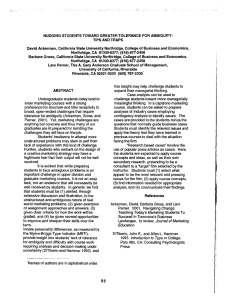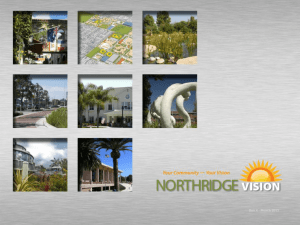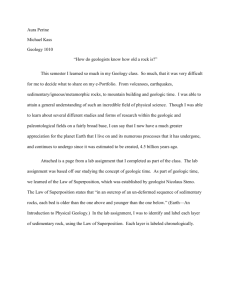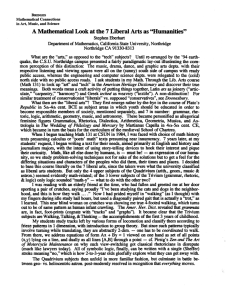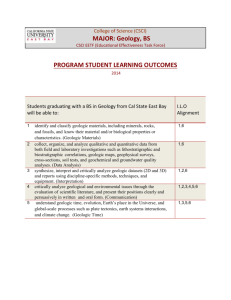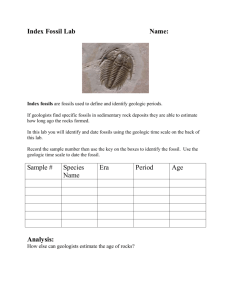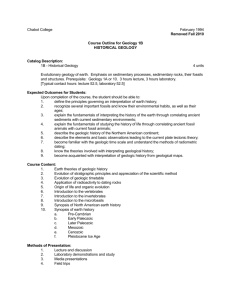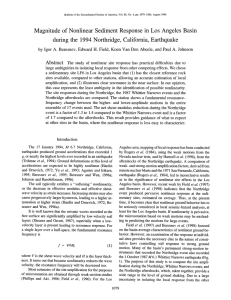General Geology
advertisement
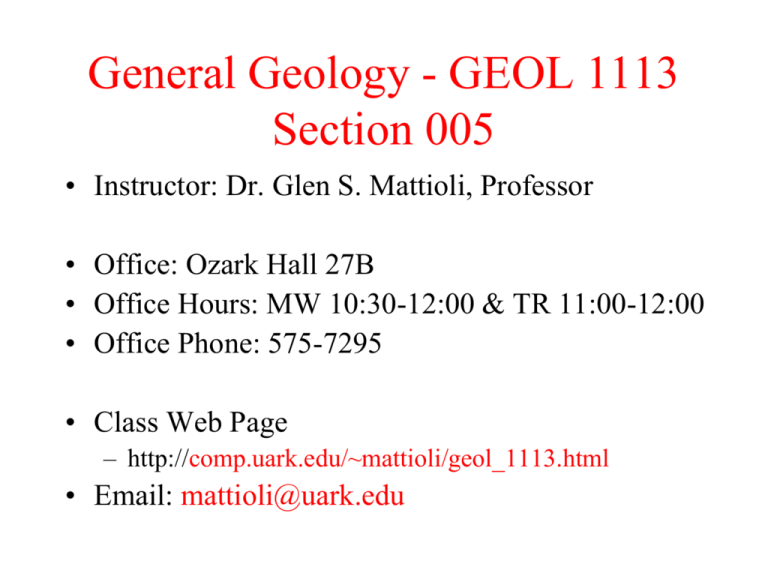
General Geology - GEOL 1113 Section 005 • Instructor: Dr. Glen S. Mattioli, Professor • Office: Ozark Hall 27B • Office Hours: MW 10:30-12:00 & TR 11:00-12:00 • Office Phone: 575-7295 • Class Web Page – http://comp.uark.edu/~mattioli/geol_1113.html • Email: mattioli@uark.edu 2009 Exams, Syllabus, and Grading Class Purpose: To introduce undergraduate students to physical geology, Earth’s internal structure and materials, and Geologic Time. Emphasis will be on developing close connections between Earth materials and processes within a Plate Tectonic framework. Three Partial Examinations and Comprehensive Final Part I - Rocks and Minerals: Thurs. Sept. 24th Part II - Geologic Time and Surface Processes: Thurs. Oct. 22nd Part III - Deformation, Earthquakes, & Earth Structure: Tues. Nov. 24th Part IV - The Big Picture: Tectonics & Orogenesis: Final Only FINAL - Monday, December 14th, 10:00 AM – 12:00 PM Some Expected Learning Outcomes • An understanding of geologic time and dating methods. • Development of skills to recognize major rock types, their constituent minerals, and their origin. • An appreciation of how the Scientific Method relates to the development of the Theory of Plate Tectonics. • An introduction to the origin and distribution of natural resources. • An understanding of three-dimensional analysis of Earth structures (big and small), and the stresses that produce them along with how major landforms relate to geological processes. • An appreciation of origin of major geologic hazards and their impacts. Grades and Grading Approximate Cutoffs for Letter Grades >85% A 71-85%B 61-70%C 50-60%D <50% F Required Text Physical Geology, th 12 ed. Charles C. Plummer California State University at Sacramento Diane H. Carlson California State University at Sacramento The Late David McGeary Emeritus of California State University at Sacramento NB that any edition of Plummer et al. from 10-12 will be OK Copyright © The McGraw-Hill Companies, Inc. Permission required for reproduction or display. Chapter 1 Introduction to Physical Geology Why Study Geology? • Mitigating Geologic Hazards – Earthquakes – Volcanoes • Supplying Things We Need – Metals – Minerals – Petroleum • Protecting the Environment – Water cycle – Global Change: Warming and Sea level rise • Understanding Our Surroundings – The Earth’s relationship to other planets – Geological Time Los Angeles Basin Recent Southern California Earthquakes Northridge (94) San Fernando (71) Whitter Narrorws (87) Sierra Madre (91) Long Beach (33) From: http://www.scecdc.scec.org/labasin.html Northridge Earthquake Facts TIME: January 17, 1994 4:30:55 am PST LOCATION: 34° 12.80' N, 118° 32.22'W; 20 miles west-northwest of Los Angeles 1 mile south-southwest of Northridge MAGNITUDE: MW 6.7 TYPE OF FAULTING: blind thrust FAULT INVOLVED: Northridge Thrust (also known as the Pico Thrust) DEPTH: 18.4 km Northridge CA earthquake Jan. 17, 1994, Northridge Earthquake Northridge Aftershocks Original AVS animation by Ian Sammis and Damien Sullivan. Northridge Rupture Model Wald, David J., Heaton, Thomas H., and Hudnut, K.W. The Slip History of the 1994 Northridge, California, Earthquake Determined From Strong-Motion, Teleseismic, GPS, and Leveling Data, Special Northridge Earthquake Issue of the Bull. of the Seismo. Soc. of America Convergent Margin Magma Genesis Eruption of Mt. Pinatubo, June 15, 1991 Soufriere Hills Volcano, Montserrat Dome collapse pyroclastic flows Photo credit: D. Williams Plymouth, Montserrat - Destroyed by pyroclastic flows in 1996/7 Photo credit: G. Mattioli Automobiles - Always Thirsty for Gas! Source: http://www.wtrg.com/oil_graphs/oilprice1947.gif Alaska Pipeline Note: Oil Prices from WTRG Economics (www.wtrg.com) and Graduate numbers from University of Arkansas 200 4 200 2 200 0 199 8 199 6 199 4 199 2 199 0 198 8 198 6 198 4 198 2 198 0 197 8 197 6 197 4 197 2 1938 - 2005 70 $70 60 $60 50 $50 40 $40 30 $30 20 $20 10 $10 0 $0 World Oil Price Annual Average in 2004 US Dollars 80 197 0 196 8 196 6 196 4 196 2 196 0 195 8 195 6 195 4 195 2 195 0 194 8 194 6 194 4 194 2 194 0 193 8 Number of "First Degree" Geoscience Graduates per Year University of Arkansas Geoscience Graduates vs Oil Price $80 Understanding our Environment • Global change through time • Stable Oxygen Isotope record – Earth’s climate has varied considerably over geological time • Sea Level Rise • Related to retreat of the last continental glaciers\ The Ice Age – new warmer climate makes the Earth more hospitable for humans • Atmospheric temperature rise now also contributing to additional rise in sea level – how will this impact coastal cities? Stable Oxygen Isotopes d18O‰ = [(Rsample - Rstandard)/Rstandard] x 1000 Sea Level Changes An Overview of Physical Geology—Important Concepts • Internal Processes: How the Earth’s Internal Heat Engine Works • The Earth’s Interior • The Theory of Plate Tectonics • Surface Processes: The Earth’s External Heat Engine - the Sun Some Heat Transfer Mechanisms • Conduction - requires direct physical contact slow; generally associated with solids • Convection - temperature gradient causes a density gradient and results in flow - faster; generally associated with fluids (liquids and gases) • Advection - transfer of heat and mass - fluid flow through cracks; can be fast • Radiation - Direct heating via EM waves without any requirement of mass along path - fastest Convection Examples Rayleigh-Benard Convection Earth Structure Convection in the Mantle models from: http://www.geo.lsa.umich.edu/~crlb/COURSES/270 convection in the mantle observed heat flow warm: near ridges cold: over cratons from: http://www-personal.umich.edu/~vdpluijm/gs205.html From: "Dynamic models of Tectonic Plates and Convection" (1994) by S. Zhong and M. Gurnis Earth’s Plates crust obvious from space that Earth has two fundamentally different physiographic features: oceans (71%) and continents (29%) from: http://www.personal.umich.edu/~vdpluijm/gs205.html global topography Convergent Margins and Magma Genesis MORB Genesis Submarine Pillow Basalt Formation Ocean Crust Age-Depth Relations Simplified Geologic Time Scale

